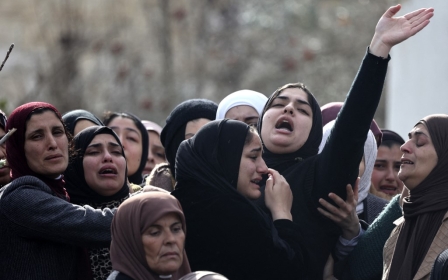Israel High Court disqualifies interior minister Deri from holding office

Aryeh Deri, Israel's interior and health minister, has been disqualified from holding his office by the High Court in a bombshell judgement that has implications for the future of Benjamin Netanyahu's government and the judiciary itself.
Deri is one of Netanyahu's most experienced allies and head of the ultra-Orthodox Shas party.
Ahead of the judgement, his Shas ally Yaakov Margi, who is welfare minister, told an Israeli radio station if Deri is disqualified then "there will be no government".
"If the court disqualifies him, the prime minister will have to decide what to do," Margi said. "We have said all along that there is no reason for Aryeh Deri not to serve as a senior minister in Israel."
Deri was convicted of tax crimes in 2022 and submitted his resignation from the Israeli parliament.
'If the court disqualifies him, the prime minister will have to decide what to do'
- Yaakov Margi, welfare minister
He struck a plea bargain with the courts, in which he said he would quit parliament and political life, only to return to it nine months later and take the position of interior and health minister.
The Israeli high court was deliberating whether Deri's appointment contravenes his plea bargain.
Deri has a controversial legal history. In 2000, he was sentenced to three years in prison for taking $155,000 in bribes while serving as interior minister.
He served 22 months in prison, and though remaining an influential figure didn't rejoin public life until 2011. He was re-elected to parliament in 2013.
Shas won 11 of the Israeli parliament's 120 seats in November's elections, making it the fifth-largest party. With the Netanyahu-led coalition governing with a majority of three seats, the withdrawal of Shas would collapse his new government.
Publicly, Deri has said that he will not step down and intimated that Netanyahu would have to fire him.
Attorney General Gali Baharav-Miara has told the High Court that she also opposed the appointment of Deri.
Baharav-Miara said Deri's appointment as minister, despite repeated convictions, does severe damage to the public's trust in the ethical conduct of elected officials.
High court under pressure
The ruling comes amid unprecedented pressure on the Israeli justice system.
Last week almost all the prosecutors and state attorneys that have served in Israel in the last half century jointly warned that planned reforms to the country's justice system would "destroy" judicial independence.
"We call on the government to withdraw the proposed plan and prevent the serious harm to the justice system and the rule of law," they said in the letter, referring to a new plan that would expand the government's power to appoint judges and impede the High Court's power to restrain parliament.
Currently, the High Court can disqualify government legislation if it contradicts Israel's 13 basic laws, particularly the Human Dignity and Liberty Basic Law. Israel's basic laws are intended to be part of the future constitution, which does not exist yet.
The reform plan, however, proposes an "override clause", which will allow parliament members to reenact a law disqualified by the High Court with a simple majority of 61 MPs.
Netanyahu, who is backing the changes, would also personally benefit from the weakening of the courts.
The prime minister is on trial for corruption, and the law could enable him to evade conviction or make see his case dismissed. Since being indicted in 2019, Netanyahu has railed publicly against the justice system, calling it biased against him.
Middle East Eye propose une couverture et une analyse indépendantes et incomparables du Moyen-Orient, de l’Afrique du Nord et d’autres régions du monde. Pour en savoir plus sur la reprise de ce contenu et les frais qui s’appliquent, veuillez remplir ce formulaire [en anglais]. Pour en savoir plus sur MEE, cliquez ici [en anglais].




